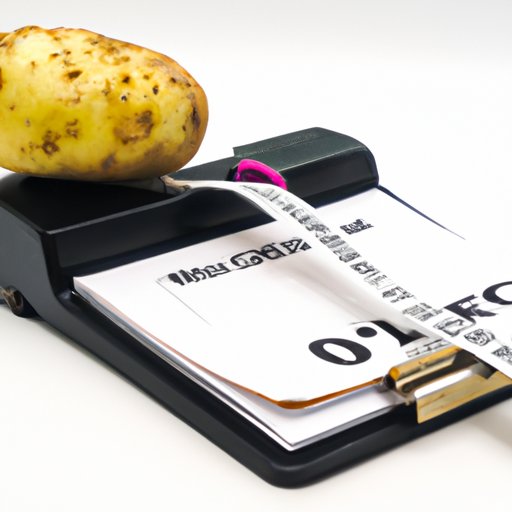
Introduction
Potatoes are one of the most widely consumed and beloved foods around the world. Yet, there’s a widespread belief that eating too many potatoes can cause unwanted weight gain. But is this really true? In this article, we’ll explore the relationship between potatoes and weight gain to separate fact from fiction. We’ll cover the common misconceptions about potatoes, the nutritional content of potatoes, and how potatoes can fit into a balanced and varied diet.
Debunking the Myth: Understanding Potatoes and Weight Gain
It’s a common belief that potatoes are a carbohydrate-rich food that inherently leads to weight gain. However, this is a myth that needs to be debunked. In fact, potatoes do not inherently make you gain weight. It’s all about how you prepare them and how you incorporate them into your diet.
According to the USDA, one medium-sized potato has about 110 calories, 2 grams of protein, and zero fat. While potatoes are indeed a source of carbohydrates, they are also nutrient-dense, containing vitamin C, potassium, and fiber.
The Truth About Potatoes and Your Scale: Separating Fact from Fiction
When it comes to weight management, calorie counting is key. It’s not just about the type of food you eat, but also about how much you eat. The same goes for potatoes.
Potatoes are relatively low in calories, so if you’re watching your weight, incorporate them into your diet in moderation. A small potato has about 100 calories, a medium potato has about 150 calories, and a large potato has about 250 calories.
Counting Calories: Why Potatoes May Not Be the Culprit Behind Your Weight Gain
Potatoes have been blamed for causing weight gain because they are often served in unhealthy ways, such as fried or loaded with butter and sour cream. However, potatoes are not the only starchy and carbohydrate-rich food that can contribute to weight gain.
In fact, compared to other starchy foods like bread, rice, and pasta, potatoes are relatively low in calories. A small serving of french fries has about 200 calories, while a medium-sized serving of white rice has about 240 calories.
The Potato Paradox: Can Eating Potatoes Actually Help You Lose Weight?
Despite their bad reputation, some studies have shown that potatoes can actually help with weight loss. This is because of their resistant starch content, which is a type of starch that resists digestion and promotes feelings of fullness.
Additionally, potatoes are naturally filling, meaning that you may be less likely to overeat when you incorporate them into your diet. As with any food, moderation and portion control are key.
From Starchy Villain to Diet Hero: A Closer Look at Potatoes and Their Effect on Weight
Potatoes have been unfairly demonized in popular culture as being “unhealthy” and “fattening.” However, this couldn’t be further from the truth. Potatoes are a nutrient-dense food that can be part of a healthy and balanced diet.
Compared to other vegetables, potatoes are high in potassium, vitamin C, and fiber. They are also low in fat and provide sustained energy. Plus, potatoes are versatile, so there are many ways to incorporate them into your diet.
Breaking Down the Science: How Potatoes Impact Your Metabolism and Weight Management
There’s a lot of science behind how potatoes are digested and metabolized in the body. There are different types of potatoes, such as white potatoes, sweet potatoes, and purple potatoes, which can have different effects on metabolism.
Additionally, eating potatoes can impact blood sugar levels and insulin resistance. However, research shows that these effects can be mitigated by the presence of fiber and resistant starch in potatoes.
Conclusion
In conclusion, potatoes do not inherently make you gain weight. It’s how you prepare them and how you eat them that matters. Incorporating potatoes into a balanced and varied diet can provide many health benefits, including sustained energy, increased satiety, and nutrient density.
So, the next time you’re considering whether or not to eat potatoes, remember that they can be part of a healthy and sustainable diet. Whether you mash them, roast them, or bake them, enjoy your potatoes in moderation and with intention.





